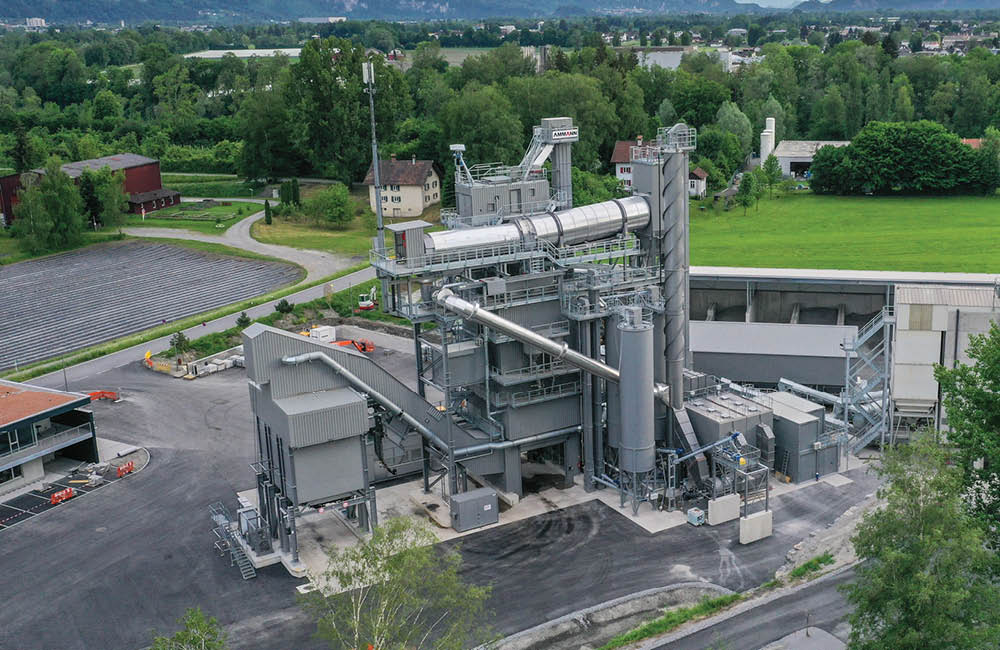UK-based OCL Regeneration is growing rapidly, with its road repair-sourced low-carbon materials for further highway work in big demand. Guy Woodford spoke to the company's managing director, Stuart Gready, about the firm's eye-catching progress and long-term plans.
Winners at the 2012 London Olympics came in many forms. Just ask OCL Regeneration's (OCL) Stuart Gready. "I identified an opportunity around circularity and decarbonisation and, after establishing OCL, spent several years on R&D [Research and Development], getting product approvals and establishing relationships. What kicked us on was being lucky enough to secure a nice amount of work around low-carbon-based building works for the 2012 Olympics in London. We were very proud when we realised the Queen had alighted from a car onto our product!"
OCL's products have been used in other major UK infrastructure projects, including Thames Gateway, Europe's largest regeneration project, stretching 40 miles along the Thames estuary from Canary Wharf in London to Southend in Essex and Sittingbourne in Kent. The area includes the largest designated brownfield site in southern England, intended to become a leading eco-region.
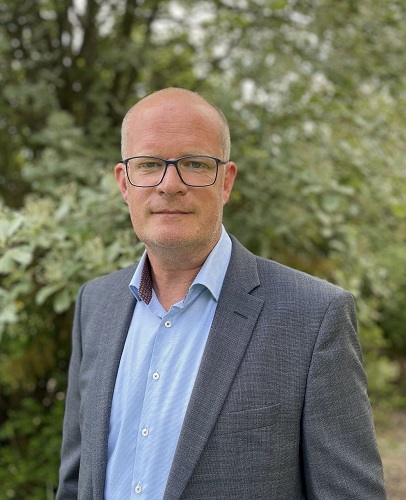
A former major UK building materials industry executive, Stuart founded OCL in Rochester, Kent, in 2006. The national consultancy and construction materials firm recycles waste generated from road maintenance, which can be reused in the local highway network. OCL specialises in creating maximum value in aggregate recycling, helping to drive industry change by delivering cost-effective, environmentally friendly and sustainable products.
Stuart says that from its national network of depots, OCL owns and operates mobile plant suitable for crushing and screening and ex-situ mixing with its mobile foamed bitumen Foambase, a Cold Recycled Bound Material (CRBM), HBM (Hydraulically Bound Material), SMR Regen and stabilisation plants.
"We run the company in two different ways," he explains. "We have a contracting, non-depot arm, so we can rapidly go out to motorways, highways, airports and other locations to provide our solutions on-site. We also have several hubs, allowing us to widen our offering while strengthening what we can achieve with our clients."
OCL's growing customer base includes numerous Tier 1 contractors, UK local authorities and big construction materials companies, including Hanson, Aggregate Industries, Milestone Infrastructure, Day Group, Tarmac, and Balfour Beatty.
"We understood that traction was growing around the global climate challenge. Many of our clients are local authorities keen on finding solutions for recycling their highways waste and getting products back to their networks while managing their carbon agendas," notes Stuart, who also advises and provides thought leadership on the building materials circular economy to industry institutions and trade associations including National Highways, the Chartered Institution of Highways and Transportation (CIHT), the Institute of Asphalt Technology (IAT), and the Institute of Quarrying (IQ).
"I came from the majors, running quarries and asphalt plants from the mid-1990s into the mid-noughties. I worked for Redland, which became Lafarge Tarmac, and I founded OCL Regeneration after a brief stint with Foster Yeoman [based in Frome, Somerset, and one of Europe's largest independent quarrying and asphalt companies until its sale to Aggregate Industries in 2006].
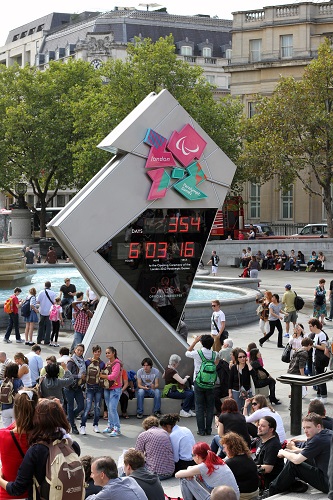
Stuart says it is "not lost" on OCL that industry majors were previously so invested in their quarries and typical primary aggregate-type activities that recycling had not gained as much traction in the UK as in some other countries. But he points out that things are changing.
"We are in a really interesting place now," he continues. "We work for all the Tier 1 suppliers. We recently, for example, signed a framework agreement with Milestone, formerly Skanska UK's Highway Maintenance and Street Lighting business. We've got five or six local authority contracts with them, which we run from our hubs."
One of the by-products of highway resurfacing, created as a result of asphalt being removed from a surface, is known as asphalt planings. Annual maintenance of highway networks produces significant quantities of this material, which can be recycled. However, a vast amount is classified as asphalt waste containing coal tar (AWCCT), a toxic material which makes it expensive to dispose of safely and difficult to recycle.
Stuart says OCL has found a way of treating and utilising the AWCCT, thereby reducing annual hazardous waste costs and the need for virgin products while lowering customer carbon footprints and helping achieve climate goals.
Hazardous asphalt planings are transported to an OCL plant where they are crushed, graded, and mixed with foamed bitumen, cement and water to form a cold lay asphalt material, which can then be re-used elsewhere in highway maintenance. This means customers minimise the use of 'virgin' materials to reconstruct roads.
"Utopia for us is the waste coming in from the road network that we process to national standards through our approved quality plan and give back to our customers as technically-apt products," summarises Stuart. "That's the bit of our business that is growing fastest. We want to move [recycled] waste up the value chain as far as possible.
"Depending on your UK location, Recycled Type 1 can now be almost £20 per tonne. Nationally, we've become a lot more astute about how we can use recycled products. That's driven from the top by the local authorities, and National Highways to some degree. I am proud to say that the new DMRB, the Design Manual for Roads and Bridges, which comes out in 2025, will have our materials in there. Our products will be available in the strategic roads network, which will help us reach the masses more quickly. Our material can replace any asphalt, anywhere. It's kind of a one-size-fits-all product."
OCL has been ISO 9001:2015 BSI-certified since 2014 (FM 608419), ISO 14001:2015 BSI-certified since 2018 (EMS 677228), CHAS (Contractors Health and Safety Assessment Scheme) accredited since 2016, had Construction Line - Gold Accreditation since 2019 (194 979), and an Avetta Consortium member since 2016 (105 063).
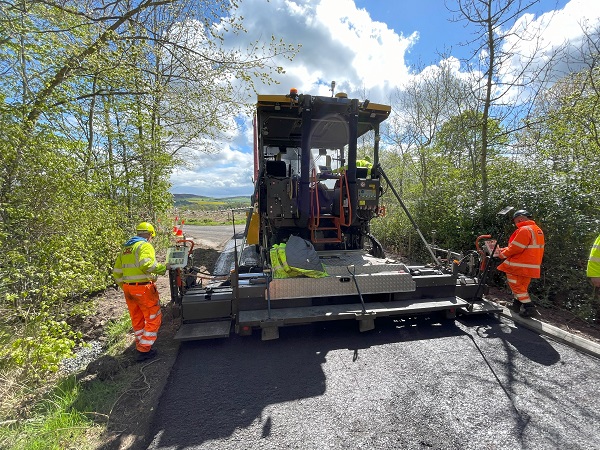
Wide-ranging products from OCL include Foambase (two products that replace traditional base and binder courses), recycled aggregates, hydraulically bound material, rolled compacted concrete, cement stabilised coarse graded aggregate, and cement bound sand.
In addition to recycling asphalt wastes containing coal tar, OCL offers recycling depot services, crushing, screening and mixing, surfacing, SMR Regen (a service using specialist mobile mixing and handling equipment), and value engineering and materials advice.
OCL has hubs in Kent, Bristol, Hampshire, Oxford, Lincoln, and Northumberland. "We are also evaluating working with Transport Scotland and SEPA [Scottish Environment Protection Agency]. Because our process is cold, we are licensed to deal with asphalt waste containing coal tar, which could be a solution for them. Until the early 1990s, coal tar was used as a binder for our roads. It was a by-product of the town gas process to heat our homes and businesses. As with many things, it's since been determined that it's a carcinogenic, hazardous waste if heated up.
"The normal hot asphalt contractor players have adapted their portfolios to put more recycled asphalt into their mixes. It means it has to be heated up, and the Environment Agency must manage the tar-bound planings completely differently. As such, we have put a lot of effort and investment into getting bespoke EA permits which state that all our hubs are hazardous waste recycling facilities. That's exciting as we're helping our clients avoid the huge costs linked to asphalt planings disposal. Disposal facilities for the old linear method of landfill disposal are very scarce, so they incur massive costs. We can take the waste in, process it and get it back to the road network from whence it came. Our mantra is 'Making tomorrow's road out of the road of yesterday'."
After achieving a £6mn turnover last year, Stuart forecasts an even better 2023. "We're on an accelerated trajectory – year on year, we're doubling our EBITDA [Earnings Before Interest, Tax, Depreciation & Amortisation]. We think this will continue for many years until we must reinvest or get involved with a big national partner."
Stuart says OCL has been "flattered" by approaches from outside the UK who have liked what the company is doing and are keen to do it themselves. "We decided that we want to make our UK business the best it can be and not get distracted by potential global expansion."
Stuart, who holds a Bsc Exploration Geology and Geophysics degree from the University of Wales, Cardiff, proudly highlights that OCL won two awards and a highly commended accolade at the prestigious 2022 Highways UK Awards. All recognitions were linked to the company's successful collaboration with Hampshire County Council and Milestone Infrastructure to establish the successful Micheldever Recycling Depot.
"It was an epiphany moment for us as we finally felt the audience was listening! It was a signal of behaviour change. We're now hearing about companies' carbon budgets and about the central government challenging local authorities by asking why they use one asphalt product over another.
"I was in a meeting last week, and a chap said, 'You know when you buy a sandwich, and you have colour codes on the packaging showing whether it's good or bad on fat, salt or protein, there will be a similar thing for sustainable building products'. That will add to the great steps some are making on their carbon reporting, but getting a 'health check' on a product that could tell a local authority, for instance, that 'this one is not so good on surface life, but fantastic on low or zero carbon' is where we are going to end up. Making it even easier to digest this complex information can only help to increase better decision-making."
Asked if OCL's highways maintenance contract customers were already seeing work increasingly given to bidders that can prove they are adopting a circular economy approach. "Yes, and I've got real examples of that. We support bid teams for many term-maintenance contracts and big civil engineering jobs. In the last year, we have noticed that the social value and environmental weightings have flipped. Some of our clients win with the best green credentials and the highest price. For me, they've cracked it!
"We're supporting some companies on a TMC tender, and there's a 60% weighting on social value and 40% on price and quality. That's a complete turnaround from a year to 18 months ago. It's a case of, "We care about what you do, and you can afford to be a bit dearer to do it.'"
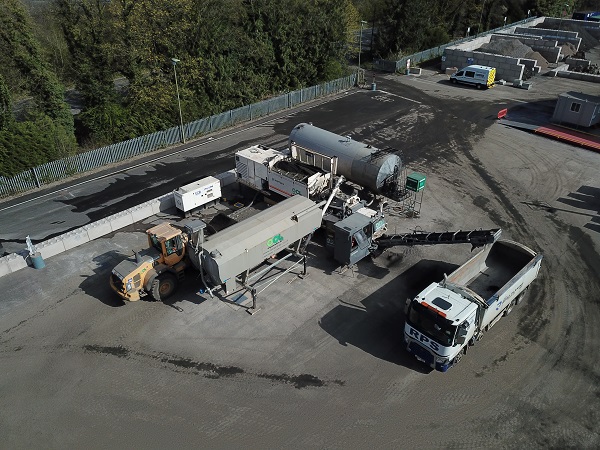
OCL predicts one of its sites will deliver a CO2 net reduction of around 450,000kg this year by reducing its use of virgin aggregates, replacing some warm and hot mix traditional asphalts with cold lay materials and reducing the total miles travelled for material supply. The company's facilities will also reduce waste construction costs by recycling tar-bound material requiring specialist disposal.
The recycled material is laid cold, which means specialist insulated lorries are not needed to collect and deliver the material, and there is no waste from unused material. Stuart explains that the cold recycled road surface uses a fifth of the energy of traditional materials and saves 50% of CO2 emissions.
OCL recently opened another material recycling depot in Kent to support the company's wider construction activities across Medway and the Hoo Peninsula.
The facility's proximity to the Hoo Peninsula, Rochester, the Isle of Grain, and the Lower Thames Crossing is important, as all are key areas for redevelopment by Medway Council as it builds a prosperous Medway for the future.
The new state-of-the-art, 3.2-acre site will reprocess and recycle waste generated from highway and pathway construction and redevelopment projects, providing a sustainable solution for new building and road maintenance projects in Kent.
By utilising treated highway waste, the new facility can significantly reduce carbon emissions by up to half, making it an eco-friendly choice compared to newly acquired concrete or asphalt.
The new OCL site is accessible to any business needing recycled concrete, asphalt, and aggregates.
Asked about the size of OCL's employee team, Stuart says: "We've come a long way from when I started the business out of the boot of my car. We've got 28 staff and five more hires in the pipeline for this year and next. We also have sub-contractors we work with to help scale up when needed."
"The mind boggles on what we could achieve when you look at the market share of what some big industry guys have. We know that 70% of UK greenhouse gases are from the building and operation of infrastructure. Of that, 40% is asphalt – the rest being concrete, cement and other products. For a Tier 1 contractor, it represents a 'big ticket item' on their journey to carbon neutrality, which they've got the same charter on. Using a like-for-like product that emits only 50% of their previous product's carbon is a big draw to us. We may be a niche player, but we are already the leading UK independent processing more [AWCCT] tonnes from more plants than others.
"Many recycling companies have been snapped up by the majors who are greening their portfolios. It means they are doing an awful lot more in our space. If we can maintain our market share, our trajectory is great."
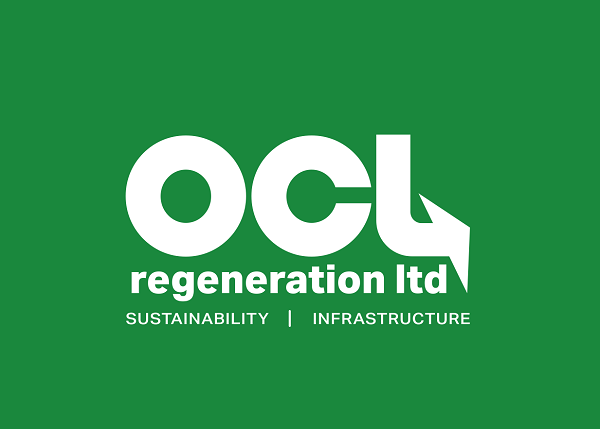
Does Stuart fear that others will look to replicate what OCL is doing? "We expect it. We wouldn't be overly concerned if there were other entrants into the market. I think competition is healthy. My only concern would be someone new coming in and doing a bad job of it and hurting the credentials of the [low- and carbon-neutral] products through some bad stories.
"I think we will maintain our first-mover status and are identifying things to set us apart from other early market entrants. For example, we do a lot with EV [Electric Vehicles], HVO [Hydrotreated Vegetable Oil] fuels, and low-carbon cement. We have signed an agreement to use clinker-free cement that only emits 180kg instead of 900kg per tonne. It's considerably more expensive to use, but we believe the investment is sound to improve carbon credentials. We're also working with O.C.O Technology, who derive a carbon-negative aggregate from an industrial process, and we use that in our mixes."
Stuart highlights that the UK makes around 27 million tonnes of asphalt annually and cites a report by The Regional Growth Fund, The Carbon Trust and Tarmac, which said up to 15% of that could be replaced with OCL's family of products. "That's a big chunk. We're doing around 100,000 tonnes a year, so it would be an uptake I would be glad to happen. Our market can only grow."
Assessment and verification of OCL's products are key, emphasises Stuart. He highlights that the company is working with, among others, the Future Highways Research Group (FHRG). FHRG was initially established by Proving Services (Proving) in 2014 as the Future Highways Research Club (FHRC), a forum for sector thought leaders to share knowledge and experiences and identify, develop and assess innovations with the potential to transform the highways sector through the application of academic research frameworks and methods.
Proving separately launched in 2016 the Value for Money (VfM) Benchmarking Club and the Value Analyser toolkit. Two years later, Proving and ADEPT formed an exclusive research partnership enabling all ADEPT members to access and participate in the research programmes and the VfM benchmarking club. In 2019, to reflect the expansion of its work and breadth of membership, the FHRC became FHRG. The FHRG now has 35 local authority members.
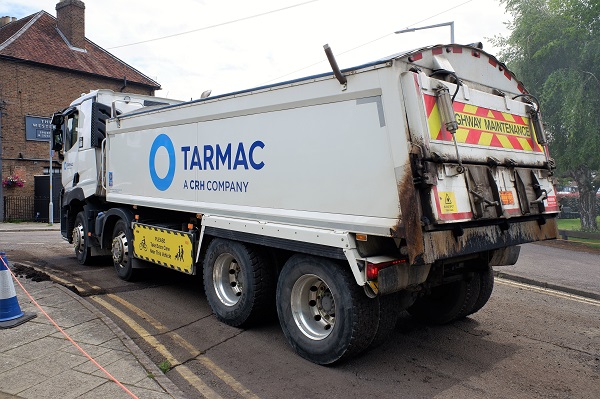
Stuart says OCL is also working towards accreditation for PAS 2080, a global standard for managing infrastructure carbon that has been authored to meet World Trade Organisation requirements.
"I think the recent facelift of PAS 2080 and the Future Highways Research Group and its work with academia will give local authorities a tool kit for scoring carbon [emissions]. Our biggest concern is how you show you've progressed if you don't know where you've been. Companies are wildly flailing around, trying to make improvements, which is fantastic, but they don't know their current carbon footprint."
Stuart speaks about OCL's work and conversations with UK local authorities: "Many are quite frankly disappointed with what's available [for carbon saving] on the market. The majors have pinned their colours to warm asphalt, which is a maybe 10%-15% [carbon] saving, and they've invested huge amounts of money in quarries and hot asphalt production. They are dipping their toe into the market through acquisitions and partnerships.
"Local authorities also don't move particularly quickly on change. They and the [building materials] majors are coming around to the fact that in the blink of an eye, we'll be in 2024, and then they'll have six years to come up with answers to the [2030 carbon emissions] targets they've set. Those climate emergency charters they've signed are legal documents. You cannot just talk your way out of them! As such, we expect considerable acceleration in this area. Having agility differentiates us from the majors and means we'll be the quickest to react to new opportunities. We see ourselves as a speedboat navigating around the oil tankers."







